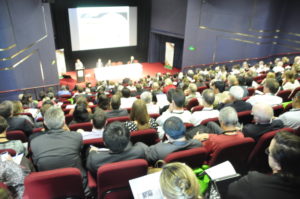 10-12 August 2015. Canberra, Australia. The Crawford Fund’s 2015 Annual Parliamentary Conference, with the theme of “The Business of Food Security,” gathered agricultural researchers, private industry and government together at Parliament House in Canberra, Australia, to discuss the future of world security.
10-12 August 2015. Canberra, Australia. The Crawford Fund’s 2015 Annual Parliamentary Conference, with the theme of “The Business of Food Security,” gathered agricultural researchers, private industry and government together at Parliament House in Canberra, Australia, to discuss the future of world security.This conference focused on the importance of collaboration and partnership between the public and private sectors to achieve sustainable intensification and improved food security.
Extract of the program:
- Visy’s Contribution to Food Security Mr Anthony Pratt, Executive Chairman, packaging manufacturer Visy Industries
- No More Business as Usual for Food Security and Nutrition: Our Shared Responsibility Her Excellency Gerda Verburg, Chair of the UN Committee on World Food Security and of the World Economic Forum Council on Food Security and Nutrition
- Animal Source Foods and Sustainable Global Food Security Ms Jessica Ramsden, Corporate and Government Affairs Manager, ANZ, Elanco
- Growing Yields, Capacity and Commercial Links in the Developing World Mr Richard Dickmann, Head of New Business Development, Bayer CropScience
- Partnerships for Impact at Scale Dr Marco Ferroni, Executive Director, Syngenta Foundation for Sustainable Agriculture
- Grow Asia: A Multi-stakeholder Approach to Food Security Ms Alison Eskesen, Director of Knowledge and Accountability, Grow Asia
Martin Kropff, director general of the International Maize and Wheat Improvement Center, or CIMMYT: There are many benefits to the private sector for increased engagement in food security programs. This included access to farmers, increased influence in the development of legal and regulatory regimes and improved corporate profiles. But we need industry linked with NGOs and other organizations,”
Gerda Verburg, chair of the U.N. Committee on World Food Security and of the World Economic Forum Council on Food Security and Nutrition.: Australia has a wealth of agricultural knowledge to export to its neighbors. Its experience farming in arid environments and producing quality products was critical to its neighbors, especially with Pacific countries demanding more nutritious products to target the growing health problems of obesity and diabetes.
In Vietnam Cargill has worked with CARE to train farmers on how to grow sustainable cocoa – Cargill has secured a more sustainable supply and CARE has gained knowledge related to quality seed and animal feed that they can extend to more and more communities. Together they have advocated at the policy level, for greater government support for innovative business models like theirs.
Mars Incorporated, a participant in CFS, is partnering with the World Food Program and others, including leading research institutes, to advance knowledge and capacity to manage food safety, particularly in the Asia-Pacific region. Mars’ supply chain is threatened by aflatoxins, found in peanuts and maize, as is the food that UN agencies deliver in humanitarian efforts. By combining their resources to address this shared challenge, they hope to build the capacity of actors in supply chains to control these risks and ensure food safety.
From the speakers the message was clear: Private sector engagement was important in food security, particularly in scaling up, but this sector was needed in association with government, NGOs, research institutes and more.Steve Ciobo, parliamentary secretary to the foreign affairs minister: An example is the work the Australian Center for International Agricultural Research is doing with Mars in Indonesia to improve the quality of cocoa farming while reducing its environmental impact and said the private sector had already invested more than $3 million in food security programs within the Asia-Pacific region, with expansions already planned. The Australian aid program will continue to work with the private sector and other partners to identify new agricultural markets.
Related:
Crawford Fund Scholarships are awarded to young students and scientists who have a genuine interest in international agricultural development in order to attend the Crawford Fund Annual Parliamentary Conference and special “Scholar Day” . It is part of the organisation's efforts to encourage young Australians to engage in international research, development and education for the benefit of developing countries and Australia. Since the program started in 2010, it has had more than 80 Scholars.

No comments:
Post a Comment